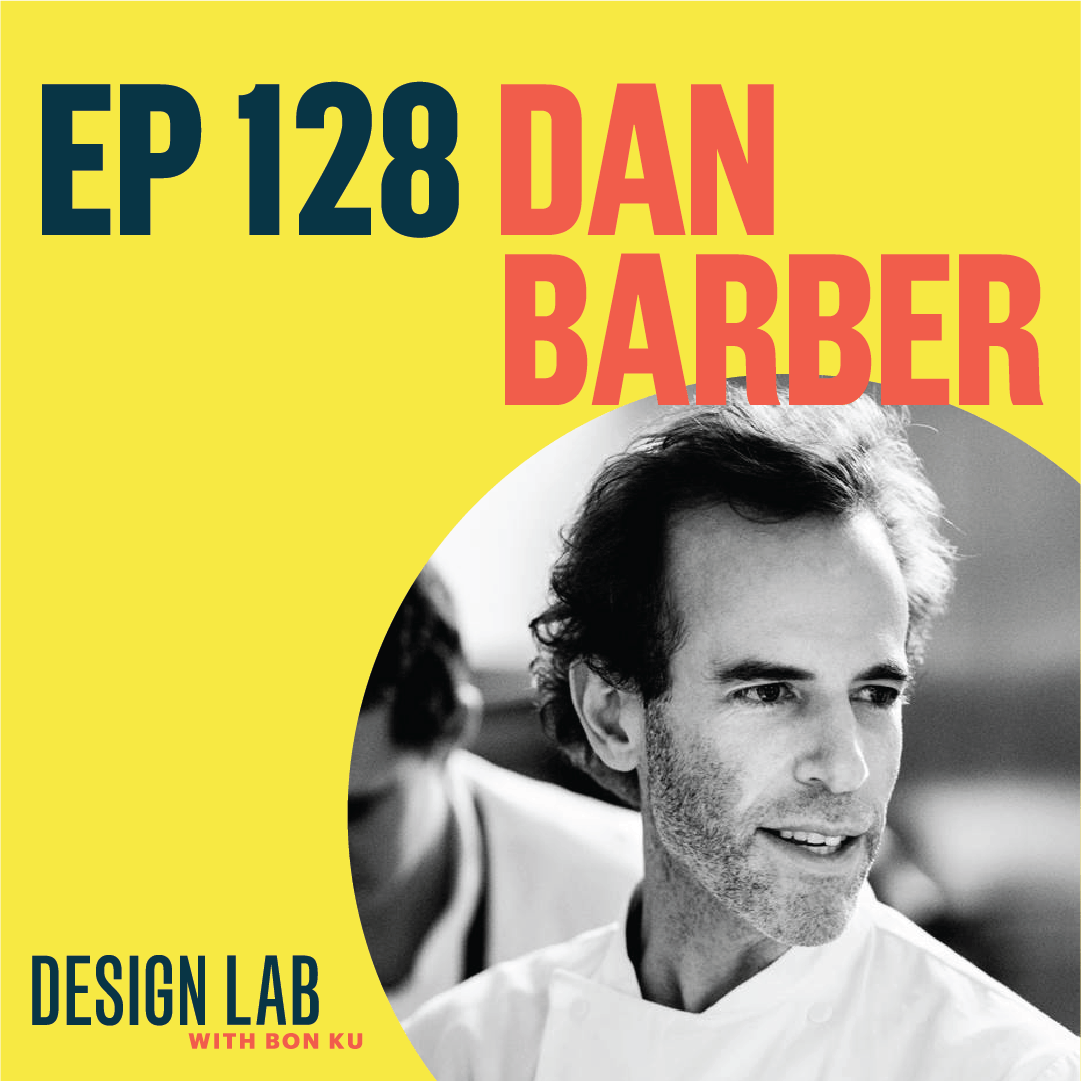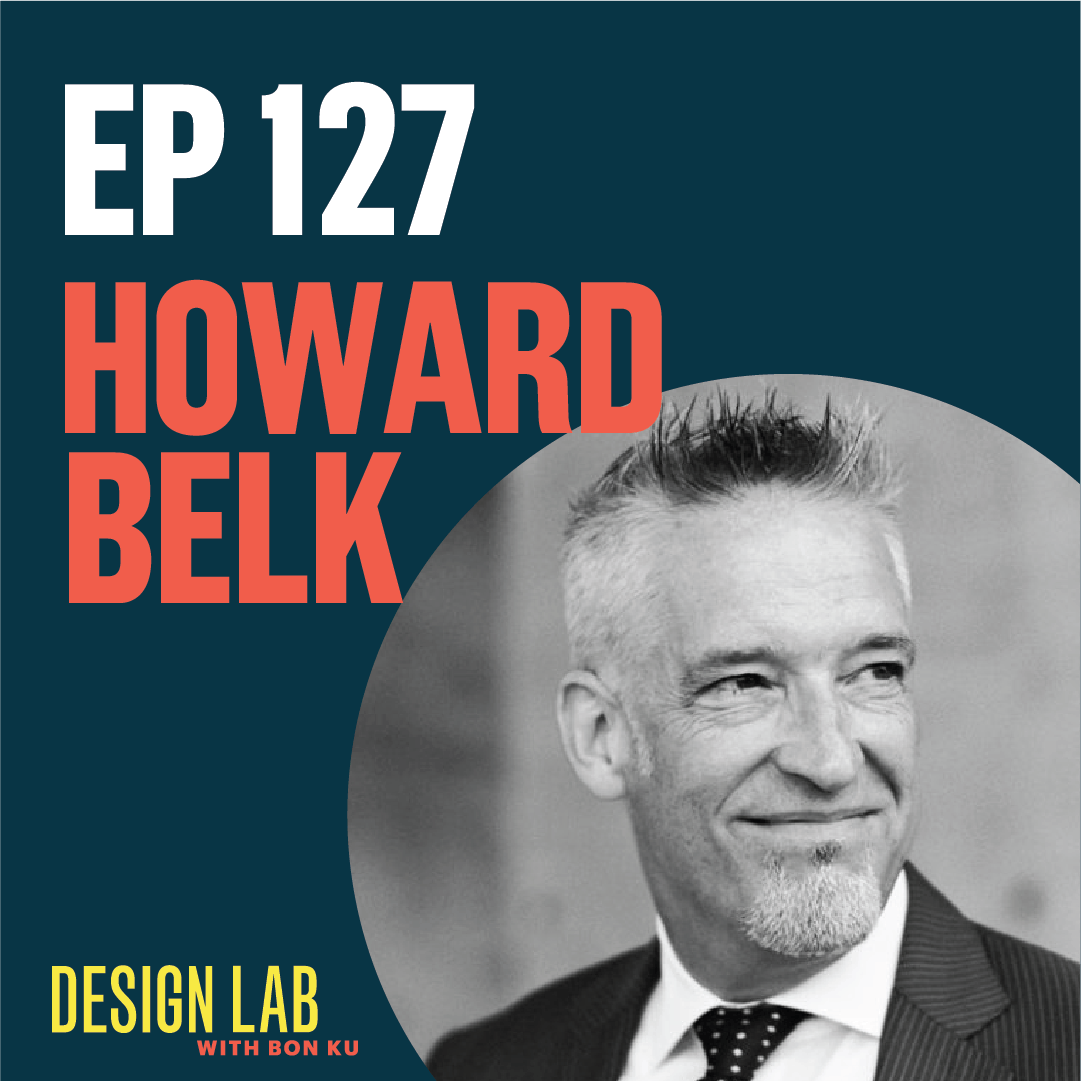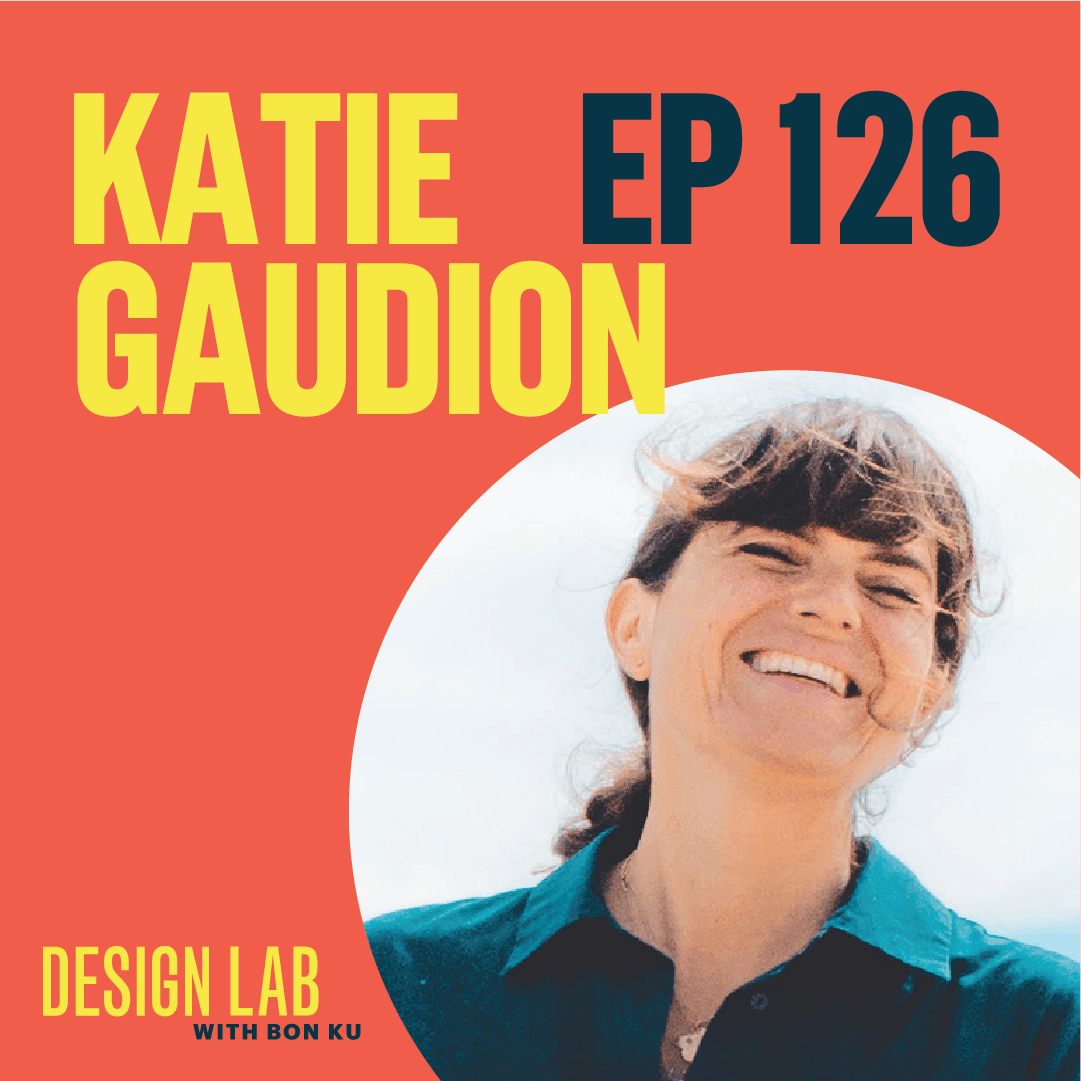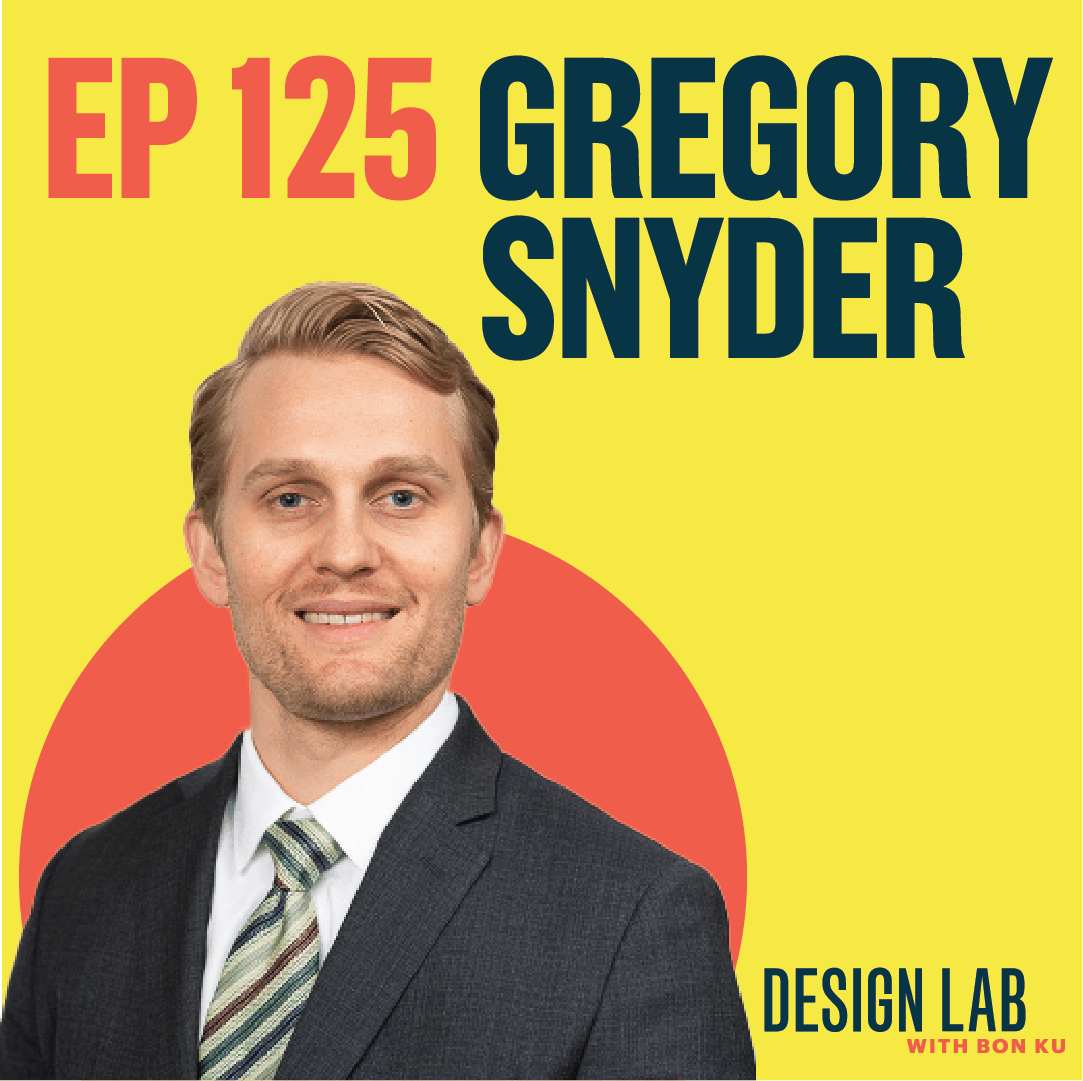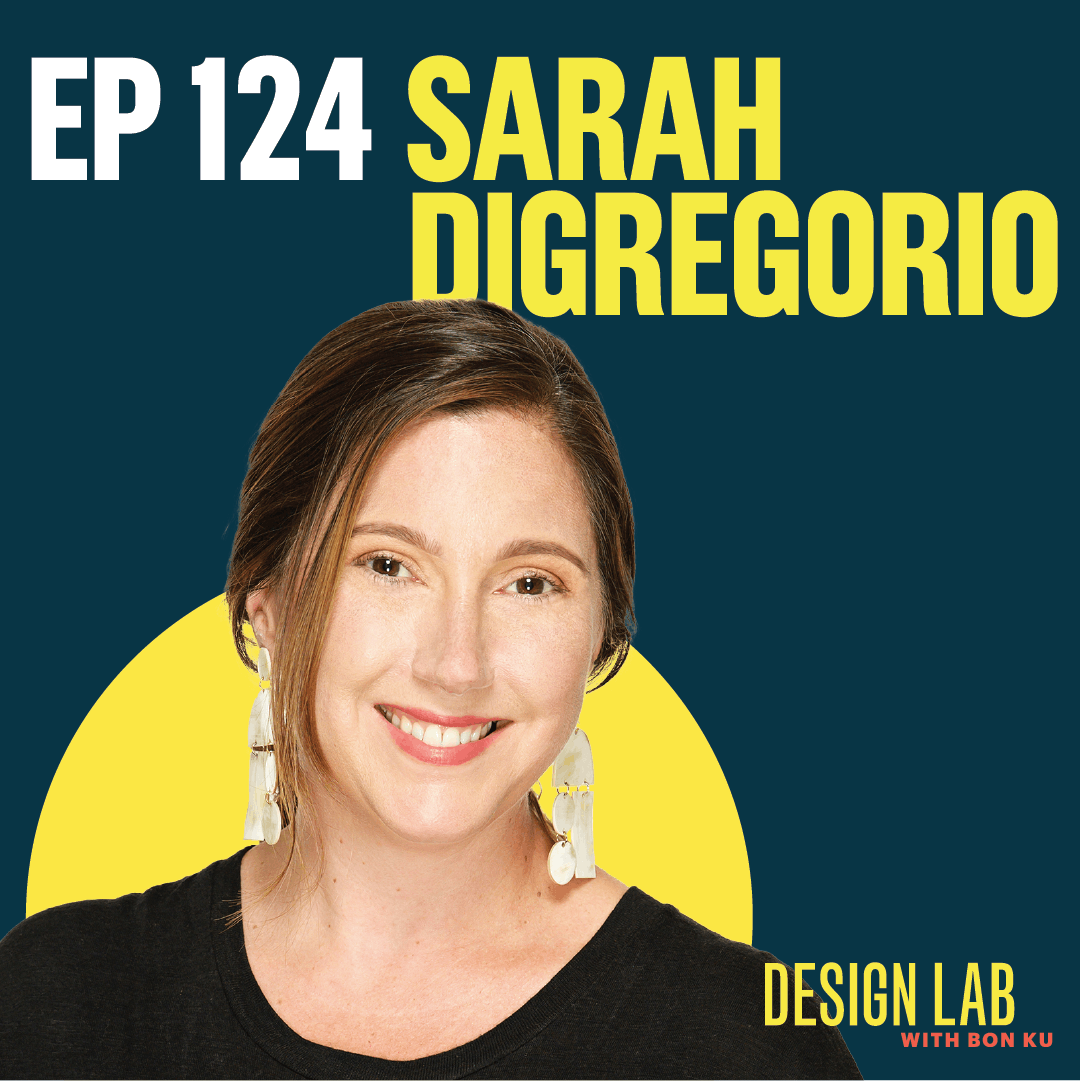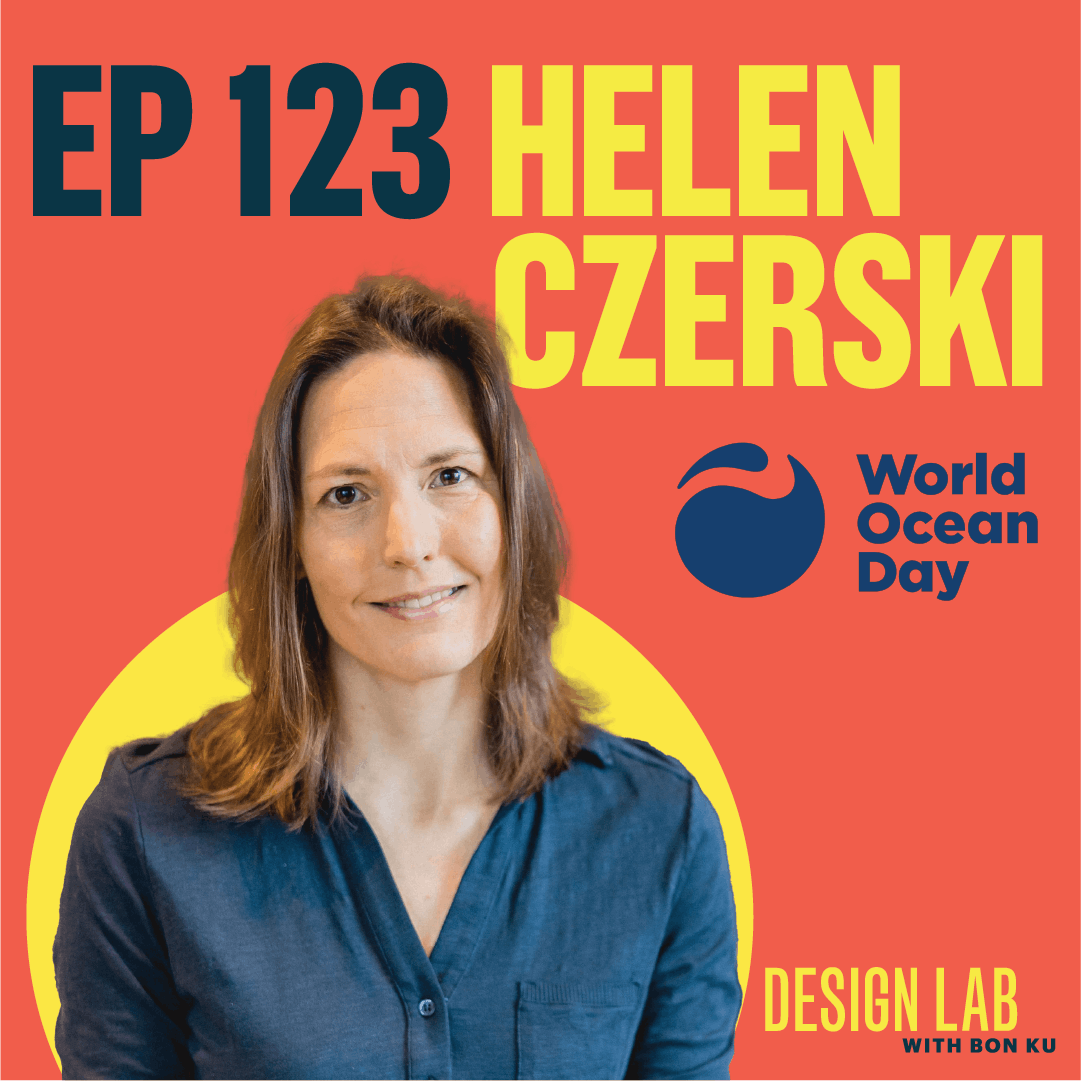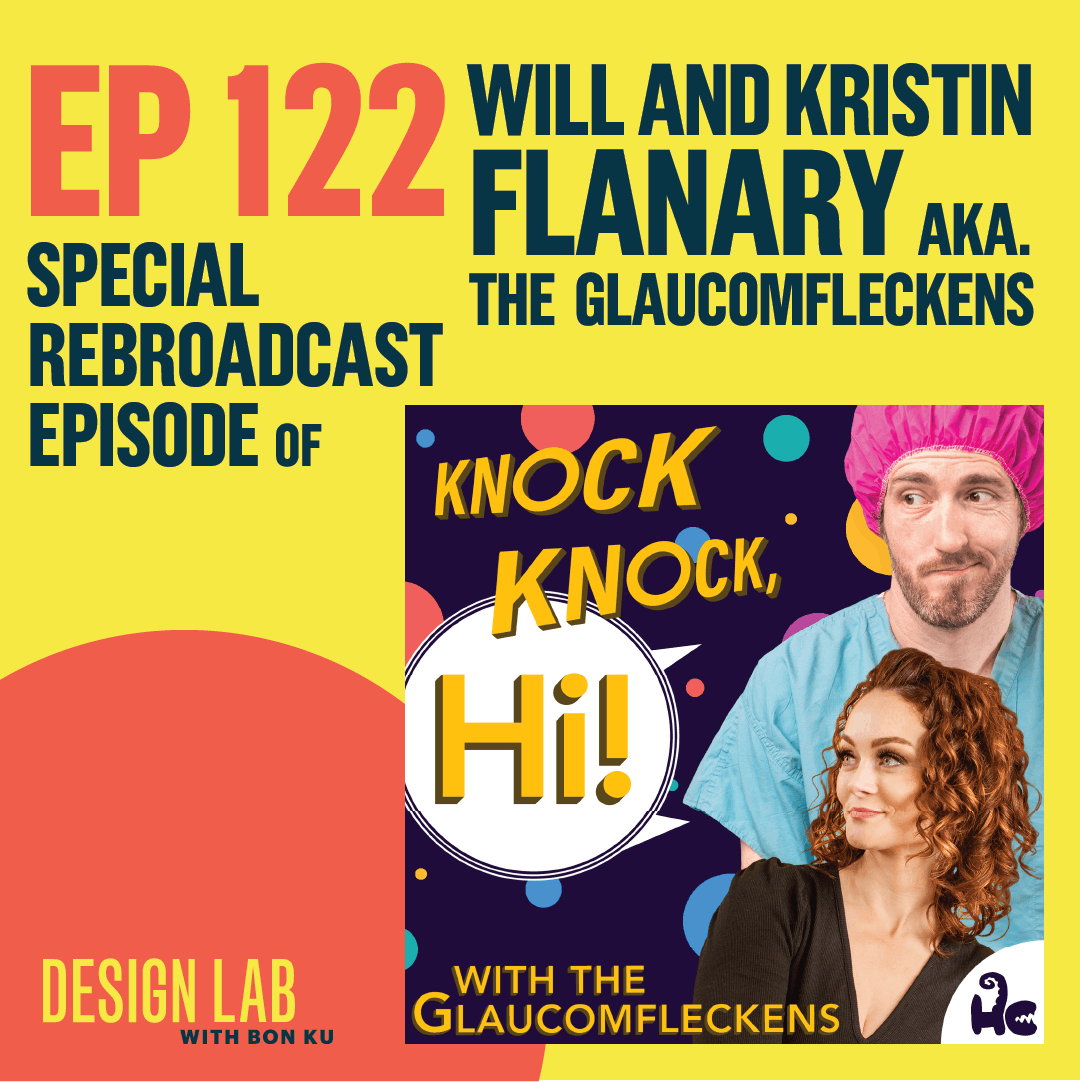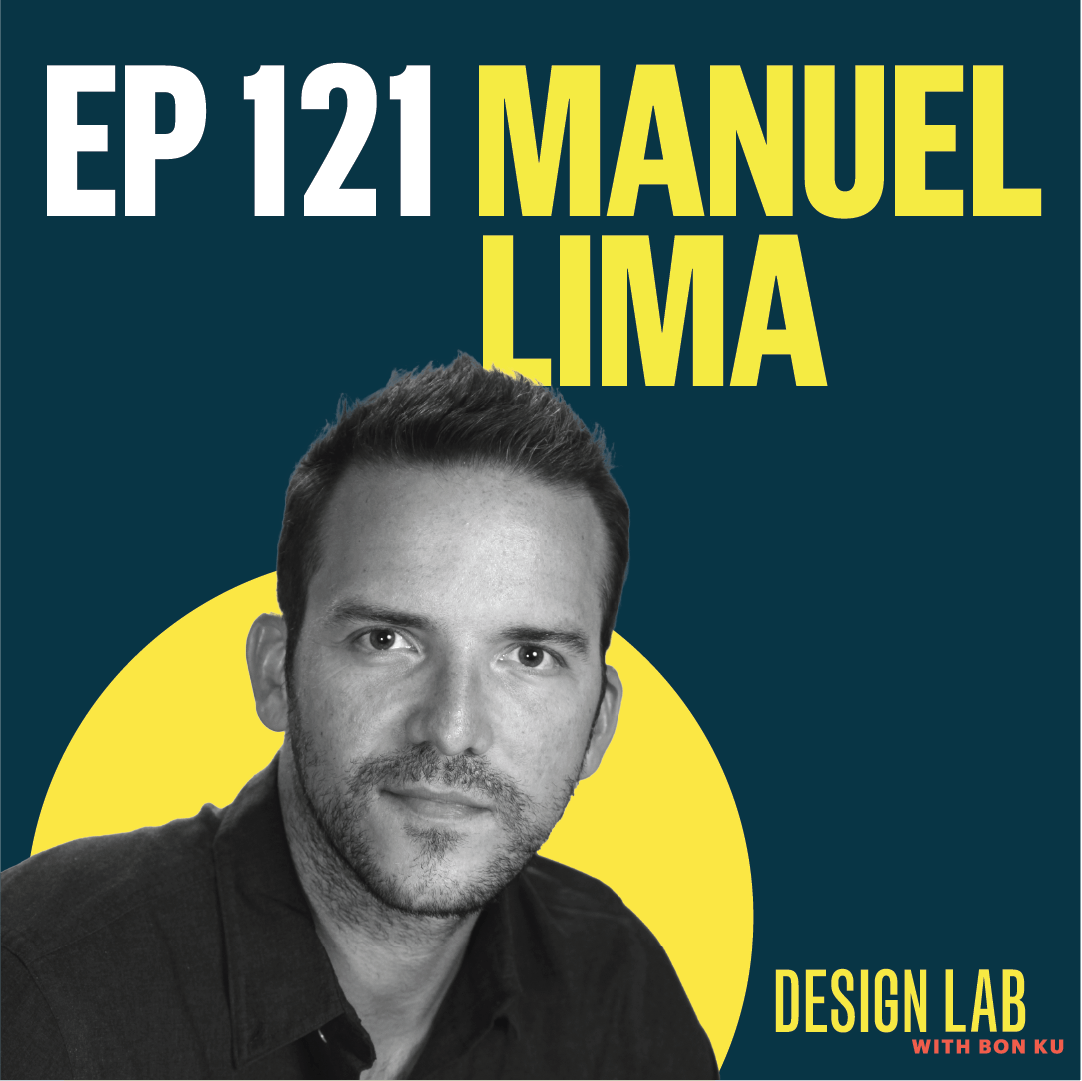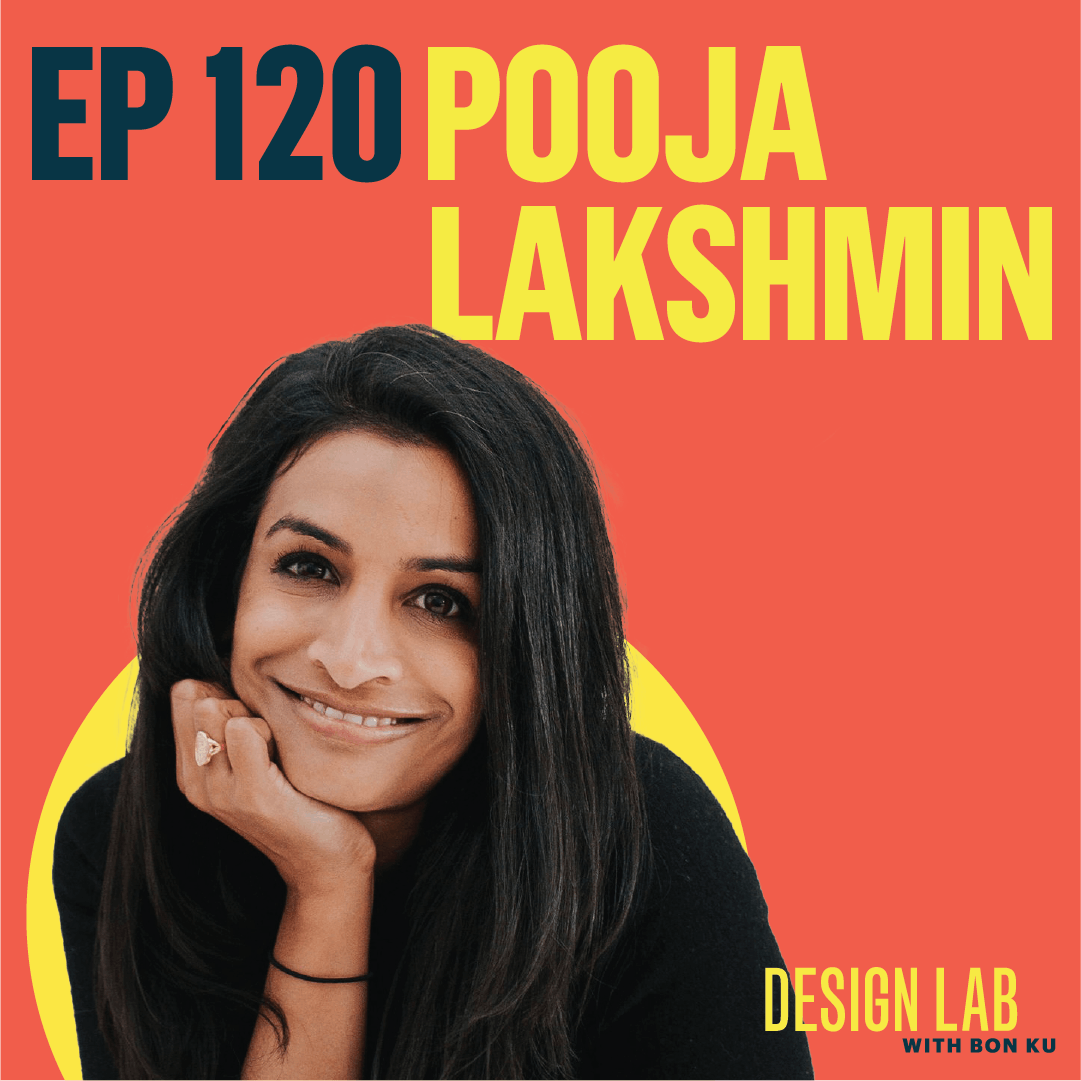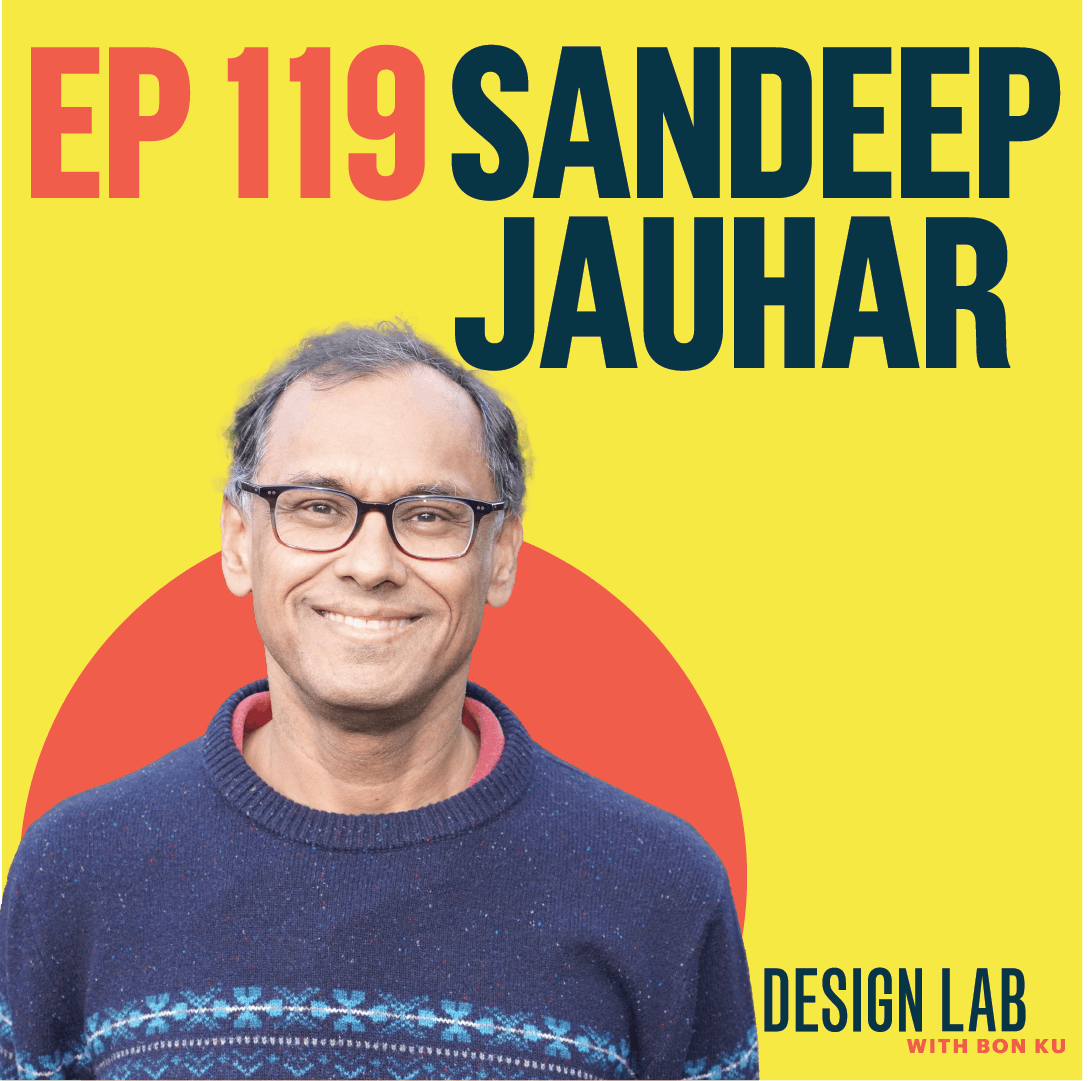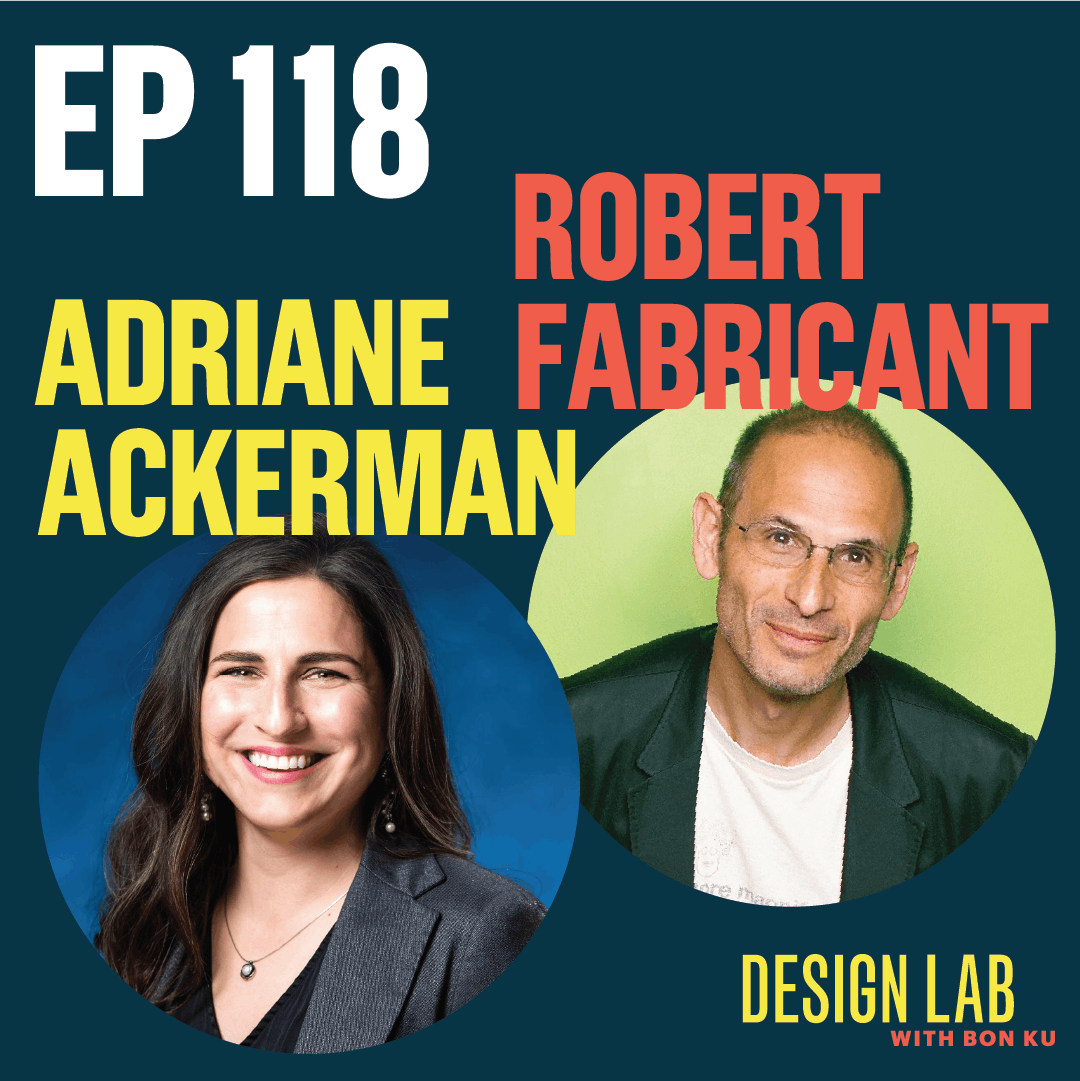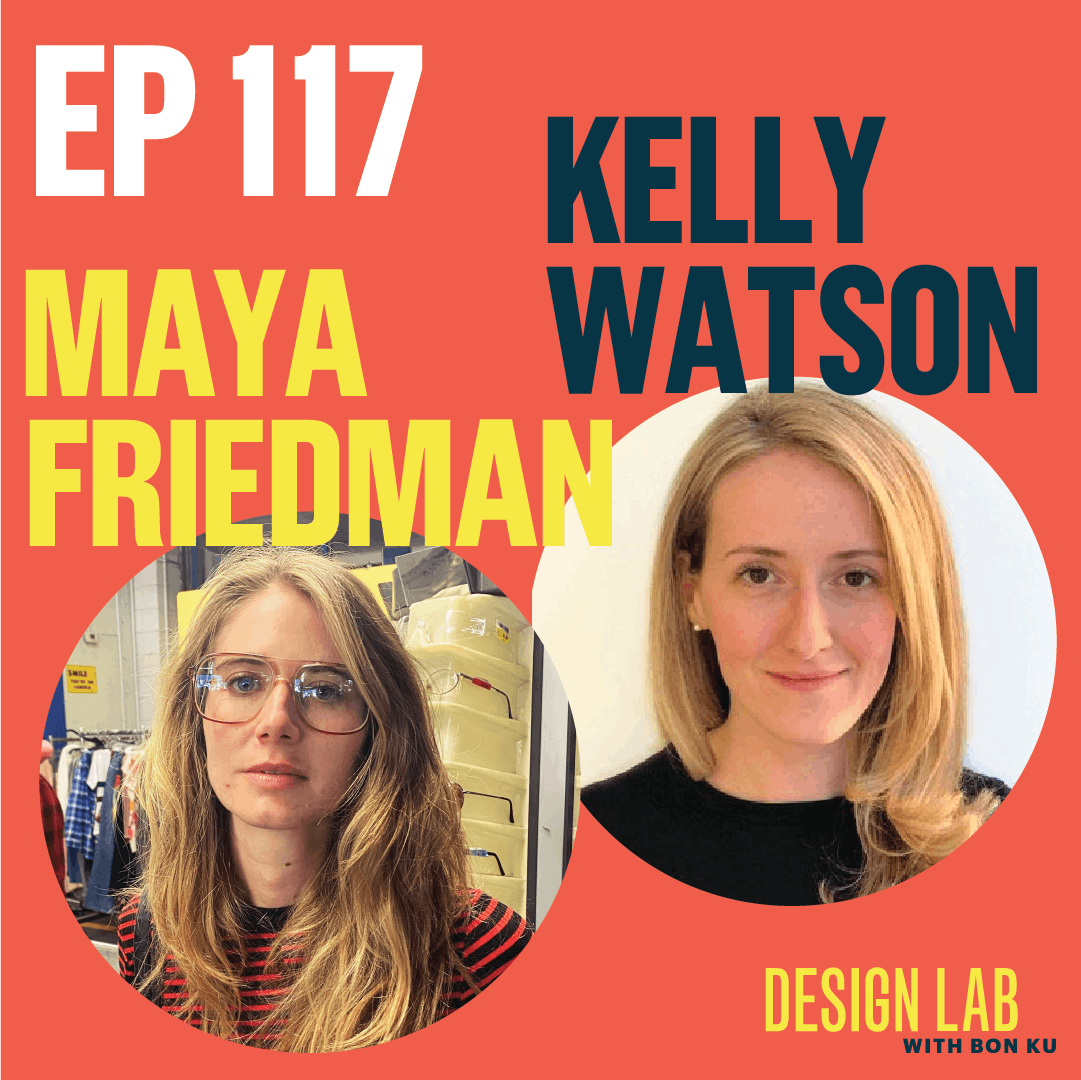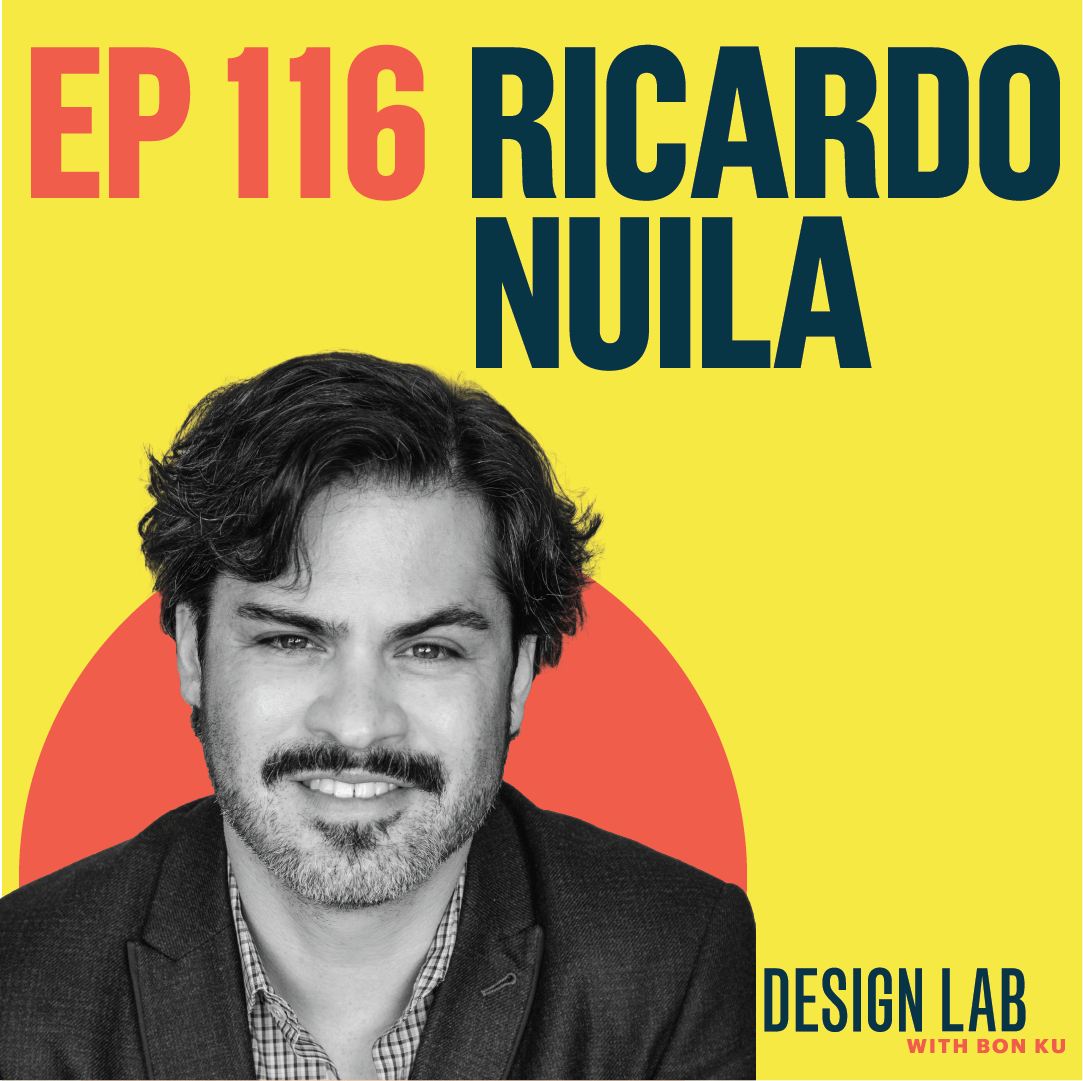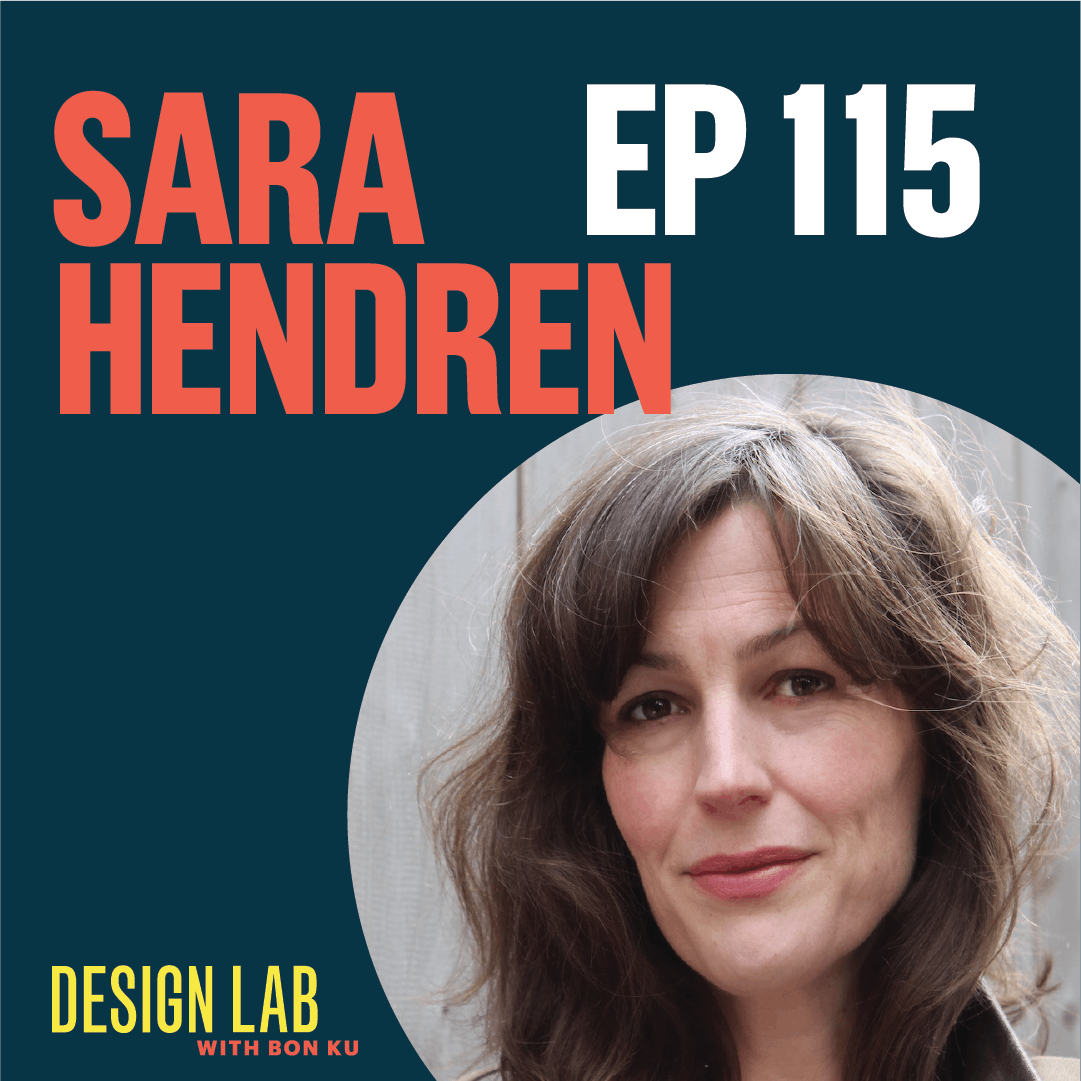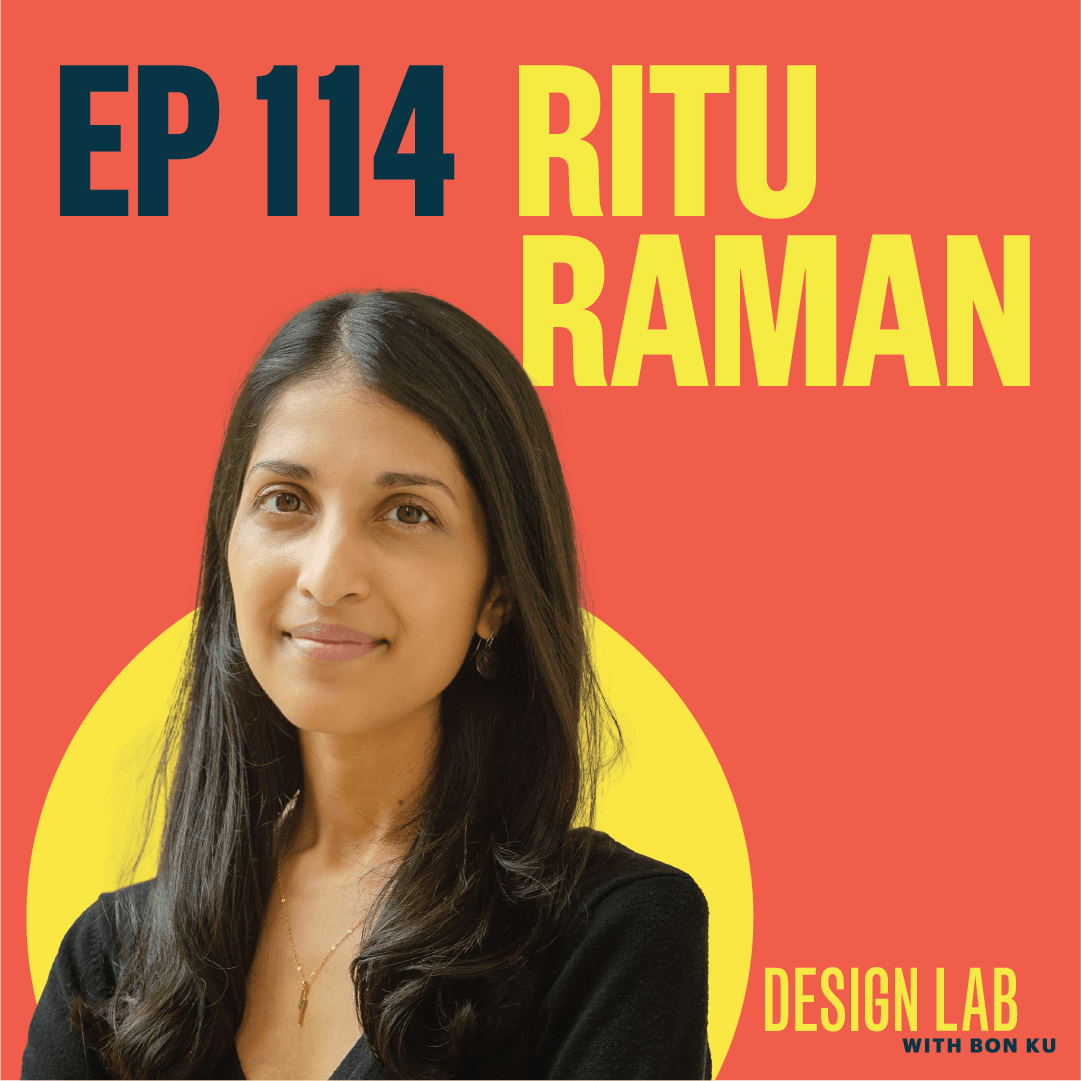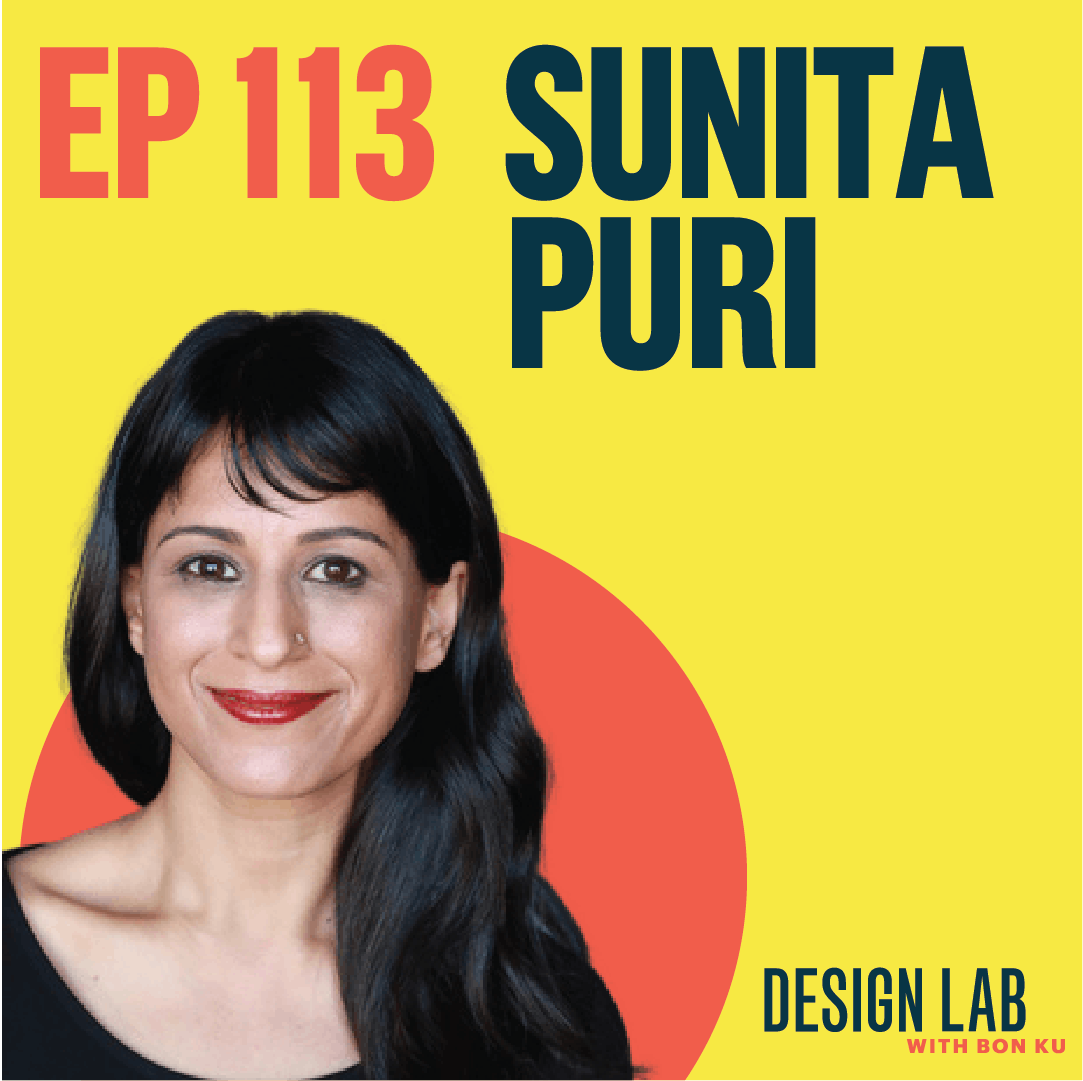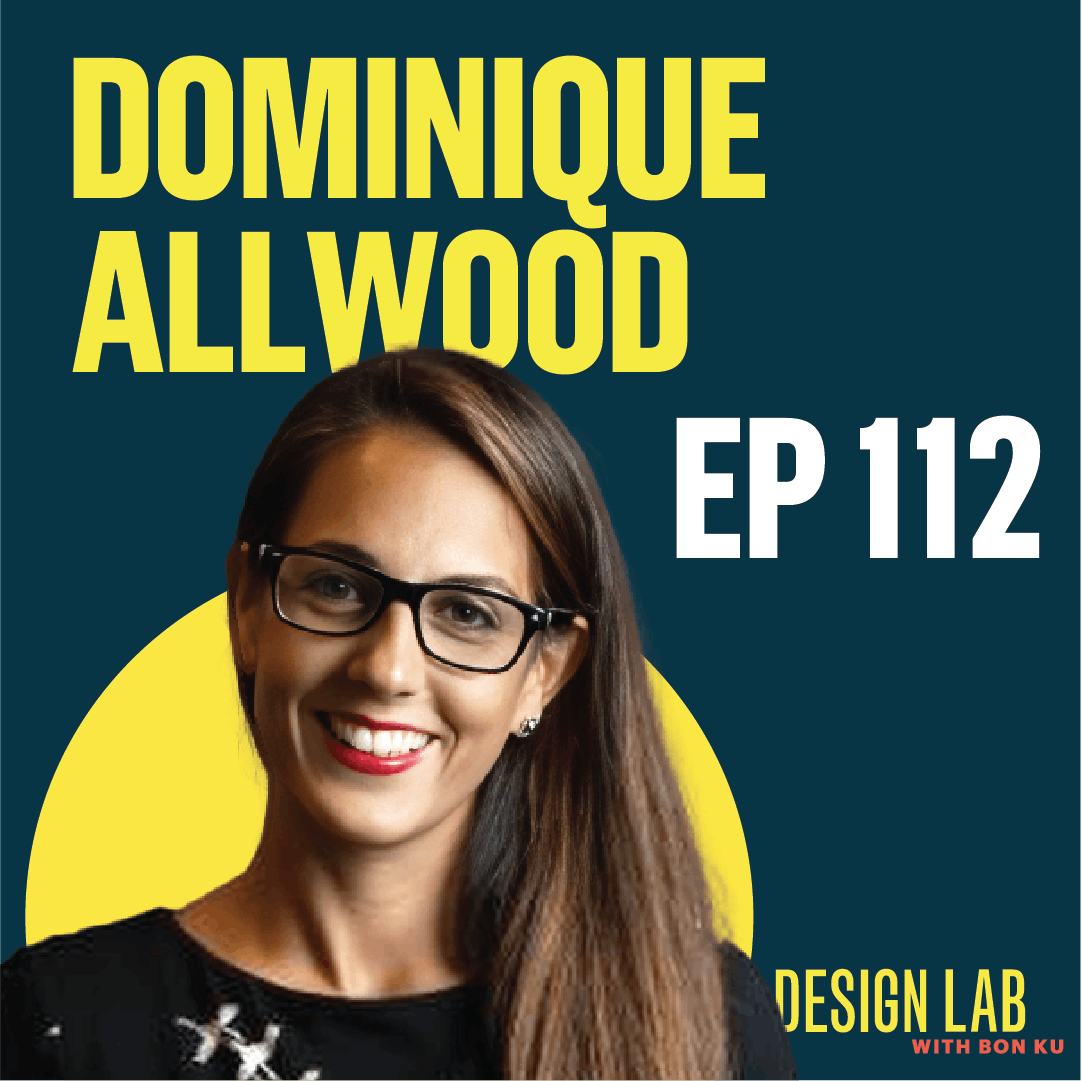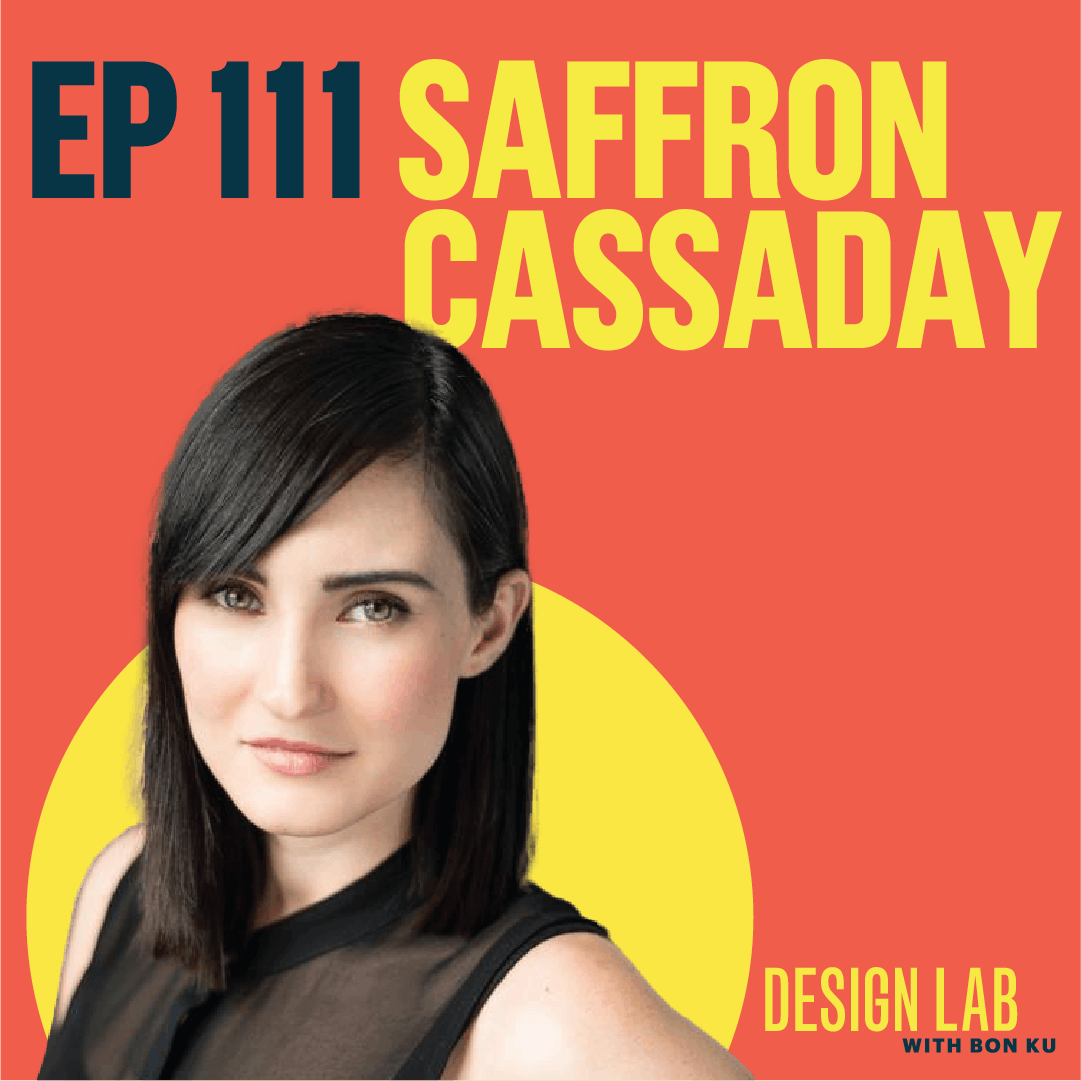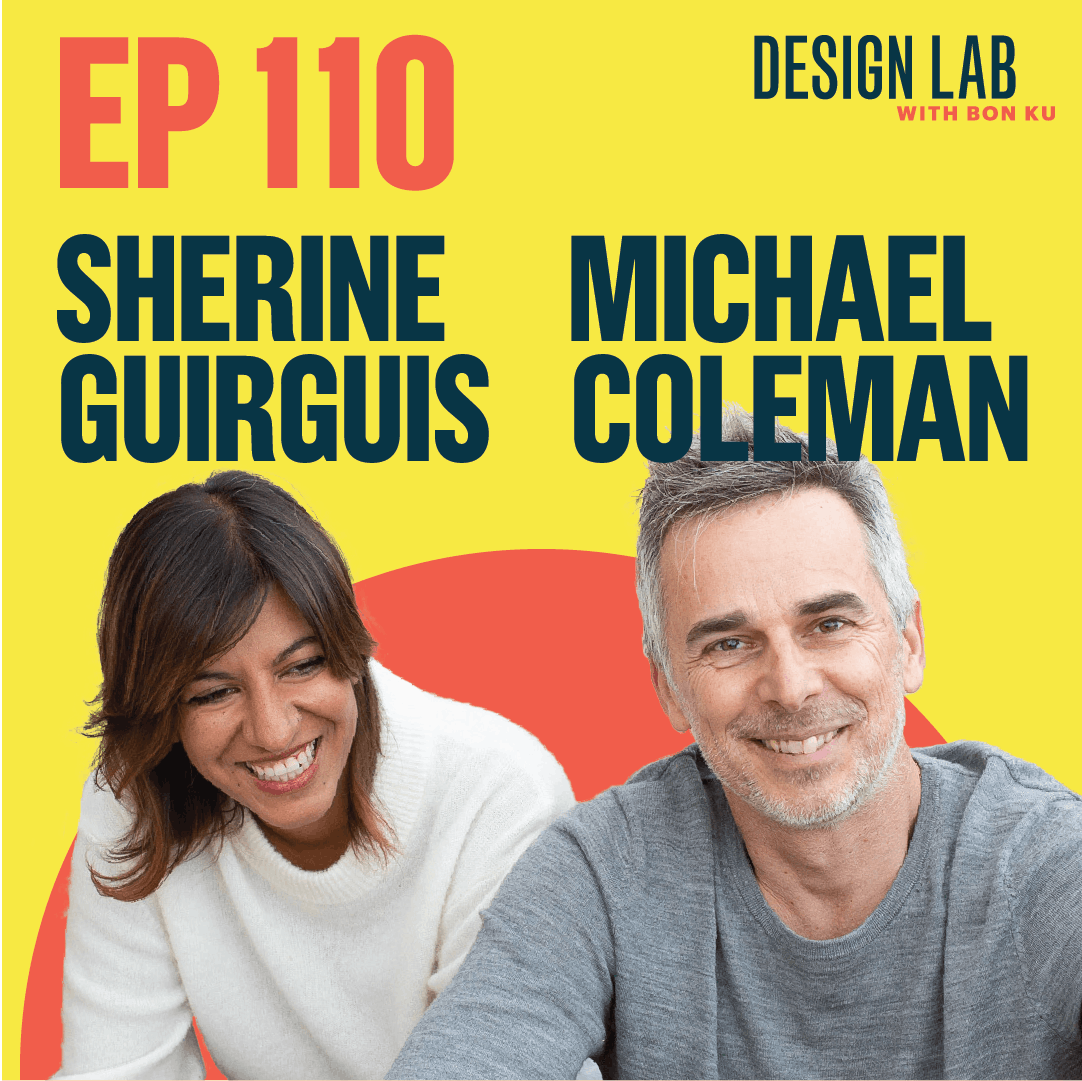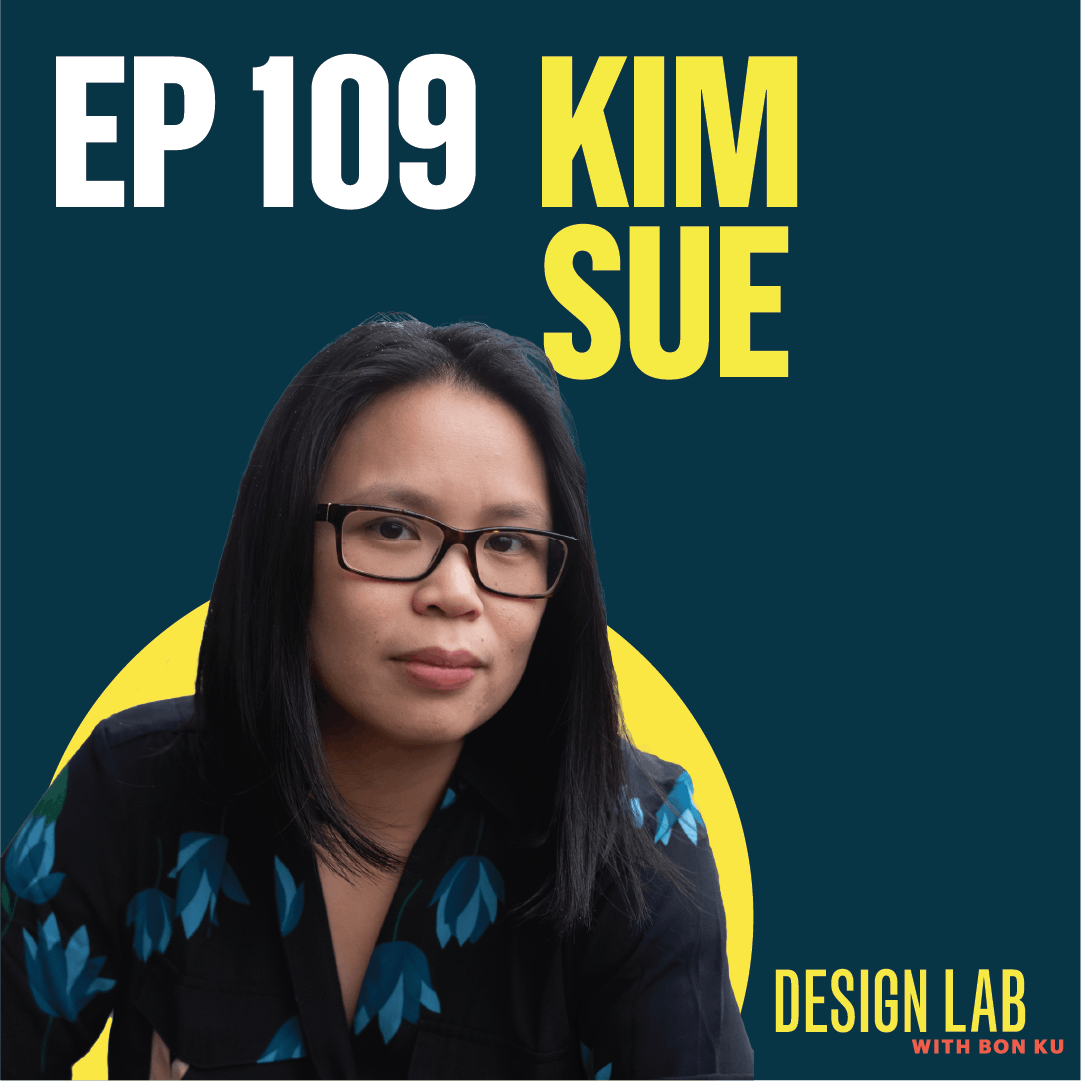Discover Design Lab with Bon Ku
Design Lab with Bon Ku

Design Lab with Bon Ku
Author: Bon Ku
Subscribed: 45Played: 1,426Subscribe
Share
Description
Does living in a well-designed city make you healthier? How can surfing increase your creativity? Have you ever wondered why hospitals are so ugly? Bon Ku is a physician and an avid fan of design, food, surfboarding, and Medicine. On DESIGN LAB, Bon and his guests tell stories at the intersection of design, science, and humanity. Listen each week and learn new insights, hacks, and design principles that you can apply to your own life. ISSN 2833-2032
129 Episodes
Reverse
This week we talk about how real food is the best medicine.
Dan Barber is chef and co-owner of Blue Hill and Blue Hill at Stone Barns in New York, and the author of The Third Plate. A fierce advocate for sustainable, ethical farming and cooking, Barber’s opinions on food and agricultural policy have appeared in The New York Times and other publications. He also co-founded Row 7 Seed Company, which brings together chefs and plant breeders to develop new varieties of vegetables and grains. Barber has received multiple James Beard awards including Best Chef: New York City (2006) and Outstanding Chef (2009). President Barack Obama appointed him to serve on the President’s Council on Physical Fitness, Sports & Nutrition. Barber continues his work to blur the line between the dining experience and the educational, bringing the principles of good farming directly to the table.
This episode was recorded live at the 2023 Aspen Ideas: Health Festival. Special thanks to the Aspen Ideas team for making this happen! Bon also wrote a blog post for the event, 5 Reasons Why Clinicians Should Think Like Designers.
Episode mentions and links:
Blue Hill Farm
Stone Barns Center for Food and Agriculture
Book: The Third Plate
Row 7 Seeds
Chef Dan Barber brings new veggie varieties to the aisle with Row 7 Seed Company
Michael Mazourek: Culinary Breeding Network
Dan’s photo credit: Richard Boll
Follow Dan: Twitter | Insta
Follow Blue Hill Farm: Twitter | Insta
Episode Website: https://www.designlabpod.com/episodes/128
This week we talk about simplicity as a strategy.
Howard Belk pulls double duty as Co-Chief Executive Officer and Chief Creative Officer of leading global brand experience consultancy Siegel+Gale, which he claims is one (or two) of the six best jobs on the planet.
He is an entrepreneur who helped a 50-year-old branding firm reestablish industry leadership by embracing its disruptor legacy. Since his arrival at the firm in 2004, he and his colleagues have established Siegel+Gale as The Simplicity Company, truly the go-to firm to help untangle the mind-bending brand mash ups that result from the entrepreneurial adventures of the CEOs they love.
Over his career, he has partnered with Fortune 500 clients to embrace the power of simplicity, purpose, experience and design to transform and grow their companies. Today, he is one of those rare birds who understands both business and design, and more importantly how to embrace one to succeed at the other.
Episode mentions and links:
Siegel+Gale
Siegel+Gale: CVS Case Study
Siegel+Gale: BMS Case Study
Howard’s photo credit: Madeline King
Howard’s restaurant rec: Omen
Howard’s book rec: The Last Days of Night by Graham Moore
Follow Howard: Twitter | Insta | LinkedIn
Follow Siegel+Gale: Twitter | Insta | LinkedIn
Episode Website: https://www.designlabpod.com/episodes/127
This week we talk about designing for diverse perspectives
Katie is a designer and researcher; she is a design consultant and Senior Research Associate at the Helen Hamlyn Centre for Design which is an Inclusive design Centre based at the Royal College of Art in London. Katie is neurodivergent (Dyslexic and Dyspraxic) and for the last 16 years has collaborated with neurodivergent people to explore ways to make their everyday lives comfortable and enjoyable. Katie has worked within a range of contexts: Supported living accommodation, mental health hospitals, garden design, healthcare services, developing design standards for the built environment and street design.
An important aspect of Katie’s PhD called: A designer’s approach: Exploring how autistic adults with additional learning disabilities experience their home environment, was to explore how to connect and engage with people beyond verbal speech. A great lesson learnt was the importance of empathy, something that can grow and develop.
Katie speaks not as an expert but as a person with lived experience and the privilege of collaborating with lots of different people.
Episode mentions and links:
Design Lab Podcast Ep 36 with Rama Gheerawo
Heart n Soul: Believe in Us
Streets for Diversity
Streets for Diversity Survey
Katie’s restaurant rec: The Jetty
Follow Katie: Twitter | LinkedIn
Episode Website: https://www.designlabpod.com/episodes/126
This week we talk about designing human-centered care, at home.
Gregory Snyder is a clinical innovator and physician executive leading technology-enabled care delivery models to improve healthcare quality and safety. He is a graduate of Princeton University, Sidney Kimmel Medical College at Thomas Jefferson University, Brigham & Women’s Hospital Internal Medicine residency, and Harvard Business School. He practices hospital medicine at Mass General Brigham Newton-Wellesley and is Entrepreneur-in-Residence at the Mass General Healthcare Transformation Lab. Greg is Clinical Assistant Professor at Tufts University School of Medicine, Associate Faculty at Ariadne Labs, and adjunct faculty for the Institute for Healthcare Improvement. He is focused on scaling virtual hospital at home programs and improving the quality and safety of home-based care as Vice President of Clinical Strategy & Quality Improvement for Medically Home. Greg has partnered with diverse healthcare technology ventures to improve healthcare quality, safety, value, and experience.
Episode mentions and links:
Medically Home
Greg’s restaurant rec: Parc Philadelphia
Follow Greg: LinkedIn
Episode Website: https://www.designlabpod.com/episodes/125
This week we talk about the story of nursing how it has shaped our world.
Sarah DiGregorio is the critically acclaimed author of Early: An Intimate History of Premature Birth and What It Teaches Us About Being Human and Taking Care: The Story of Nursing and Its Power to Change Our World. She is a journalist who has written on health care and other topics for the New York Times, the Washington Post, the Wall Street Journal, Slate and Insider, among others. She lives in Brooklyn, New York, with her daughter and husband. For more information please visit her website: http://sarahdigregorio.com/
Episode mentions and links:
Sarah’s Website
Book: Taking Care: The Story of Nursing and Its Power to Change Our World
Book: Early: An Intimate History of Premature Birth and What It Teaches Us About Being Human
Book Review: Healing the Unsung Healers via NYT
Sarah Digregorio at HarperCollins Publishers
Sarah’s restaurant rec: Ayat NYC
Follow Sarah: Twitter | Insta | LinkedIn
Episode Website: https://www.designlabpod.com/episodes/124
Today we talk about building a healthy relationship with the ocean.
Helen Czerski was born in Manchester. She is an Associate Professor in the Department of Mechanical Engineering at University College London. As a physicist, she studies the bubbles generated by breaking waves in the ocean to understand their influence on weather and climate. Helen has been a regular presenter of BBC TV science documentaries since 2011. She also hosts the Ocean Matters podcast, is part of the Cosmic Shambles network, and is one of the presenters for the Fully Charged Show. She has been a science columnist for the Wall Street Journal since 2017 and she is the author of the bestselling Storm in a Teacup: The Physics of Everyday Life, Bubbles: A Ladybird Expert Book, and Blue Machine: How the Ocean Works.
Episode mentions and links:
Helen's Website
Helen’s latest book: The Blue Machine: How the Ocean Works
Helen’s other works
Scripps Institute of Oceanography
Article by Helen: Why we need to respect Earth’s last great wilderness – the ocean - via The Guardian
Helen’s restaurant rec: Old Ship Hammersmith
Follow Helen: Twitter | Insta | LinkedIn
Episode Website: https://www.designlabpod.com/episodes/123
This week, Bon talks about redesigning medicine with Will and Kristin Flanary (aka the Glaucomfleckens)!
Knock Knock, Hi! Is a podcast and YouTube series hosted by Will and Kristin Flanary (aka the Glaucomfleckens). I had the chance to join this famous duo on their show and chat about redesigning medicine. We talk about why fax machines are still a thing, how I can die happy if we figure out how to eliminate hallway beds from ever being a thing, And how Dr. Glaucomflecken really just nailed his emergency medicine character. ICYMI we are rebroadcasting that interview for you this week on Design Lab. If you want to see the video of the episode or listen to the full episode of Knock Knock, we’ll share links in the show notes.
Episode mentions and links:
The Glaucomfleckens
Lady Glaucomflecken
Dr. Glaucomflecken
Knock Knock, Hi with the Glaucomfleckens!
Video of the episode via YouTube
Human Content Productions
"Why do hospitals still use fax machines? Jefferson's Bon Ku has no answers for medical comedian" - Via The Philadelphia Inquirer’s Tom Avril
Follow Dr. Glaucomflecken: Twitter | Facebook | LinkedIn | Instagram | YouTube | TikTok
Follow Lady Glaucomflecken: Twitter | Facebook | LinkedIn | Instagram
Episode Website: https://www.designlabpod.com/episodes/122
This week we talk about The New Designer: rejecting myths and embracing change.
Manuel Lima is an internationally renowned designer and author of three bestsellers that have been translated into several languages: The Book of Circles, The Book of Trees, and Visual Complexity. Named “one of the 50 most creative and influential minds” by Creativity magazine, he is a fellow of the Royal Society of Arts and a leading voice on information visualization. His talks have been watched by more than three million people around the world and he has been featured in such magazines and newspapers as Wired, New York Times, Science, Nature, BusinessWeek, Fast Company, Forbes, and El País. The founder of VisualComplexity.com and a regular teacher at Parsons School of Design, he has over fifteen years of experience designing digital experiences and leading product teams at such companies as Google, Microsoft, and Nokia. His new book is The New Designer: Rejecting Myths, Embracing Change (MIT Press, May 2023).
Episode mentions and links:
https://www.mslima.com/
Book: The New Designer: Rejecting Myths, Embracing Change
Manuel’s previous publications
A Visual History of Human Knowledge via TED Talks
Six Principles for Designing Any Chart via Medium
Manuel’s restaurant rec: Asia
Follow Manuel: Twitter | Facebook | LinkedIn | Insta
Episode Website: https://www.designlabpod.com/episodes/121
This week we talk about designing real self-care versus faux self care.
Dr. Pooja Lakshmin, MD is a psychiatrist and author, the founder of Gemma, the digital community focused on women’s mental health and equity; and a contributor to The New York Times. Her new book, REAL SELF-CARE: Crystals, Cleanses, and Bubble-Baths Not Included, has been featured on Good Morning America, NPR’s Code Switch and 1A, Talks @ Google, The New York Times, Vox, and The Guardian. Pooja has spent thousands of hours taking care of women struggling with burnout, despair, depression, and anxiety in her clinical practice. Her work focuses on the intersection of mental health and gender. She frequently delivers keynotes and consults with organizations and Fortune 500 hundred companies to help women and marginalized groups feel empowered and to connect with their agency in the workplace.
Episode mentions and links:
https://www.poojalakshmin.com/
https://www.gemmawomen.com/
Hope Is Not a Thing to Have—It’s a Skill to Practice via Oprah Daily
How to Escape ‘Faux Self-Care’ via NYT
How Society Has Turned Its Back on Mothers via NYT
Pooja’s restaurant rec(s):
Matt's El Rancho
Meanwhile Beer
Sushi Bar Hospitality
Follow Pooja: Twitter | Instagram | LinkedIn
Episode Website: https://www.designlabpod.com/episodes/120
This week, we are talking about designing better dementia care.
Sandeep Jauhar has written several bestselling books, all published by Farrar, Straus, and Giroux. His latest book, "My Father’s Brain," published in April 2023, is a memoir of his relationship with his father as he succumbed to dementia. In the book, Jauhar sets his father’s descent into Alzheimer’s alongside his own journey toward understanding his father’s disease.
A practicing physician, Jauhar writes regularly for the opinion section of The New York Times. His TED Talk on the emotional heart was one of the ten most-watched TED Talks of 2019. To learn more about him and his work, visit his website at www.sandeepjauhar.com or follow him on Twitter: @sjauhar
Episode mentions and links:
https://sandeepjauhar.com
My Father's Brain: Life in the Shadow of Alzheimer's
Sandeep’s restaurant rec: Claro BK
Follow Sandeep: Twitter | Instagram | LinkedIn | Facebook
Episode Website: https://www.designlabpod.com/episodes/119
On today's episode, we are going to talk about designing for health equity.
Adriane Ackerman is a community convener, strategic innovator and life-long rabble-rouser. She currently directs several programs at the Pima County Health Department in Southern Arizona, including a $4 million grant program from the Department of Health and Human Services’ Office of Minority Health to Advance Health Literacy, the department’s new Cultural Health initiative with its pilot project, SaludArte, the emerging Pima County Network for Equity and Resilience (PCNER), and the first ever Office of Health Policy, Resilience, and Equity, all of which aim to increase health literacy and equity through innovative models, by elevating and centering the leadership of historically and contemporarily excluded communities. Adriane holds dual Bachelor’s degrees in Political Science and Urban & Public Affairs and seeks to bring the depth of her lived experience to bear as she convenes, facilitates and uplifts the work of harm reduction from within bureaucracies and community partnerships.
Robert Fabricant is Co-Founder and Partner of Dalberg Design, where he brings human-centered design and innovation services to clients looking for new, creative approaches to breakthrough innovation and expanded collaborations in the field of social impact and international development. Before Dalberg, Robert Fabricant was the Vice-President of Creative for frog design, where he managed frog’s global leadership across Design Research, Product Design, Software Design, and Experience Strategy. Robert writes about Design and Social Impact for publications like HBR, SSIR, Fast Company, Rotman Business Journal, MIT Tech Review, ChangeObserver, and Core77. He is a member of the adjunct faculty at NYU and SVA. His client portfolio includes experience across verticals including financial services and financial inclusion, social impact, mobile and technology, healthcare and public health, and media. Robert has an MPS in Design and Technology from NYU and a BA from Yale University.
Episode mentions and links:
https://www.fabricant.design/
https://dalberg.com/who-we-are/our-leadership/robert-fabricant/
https://www.adrianeackerman.com/
Adriane’s previous work: https://www.portlandpeoplescoalition.org/
Adriane’s restaurant rec: La Indita (a mixture of native Sonoran, Pascua Yaqui, and Tarascan cuisine)
Robert’s restaurant rec: Le Succulent
Follow Adriane: LinkedIn
Follow Rob: LinkedIn | Twitter
Episode Website: https://www.designlabpod.com/episodes/118
On today's episode, we are going to talk about designing open source medical software.
Maya Friedman is a digital product design lead and art director who designs solutions for unmet needs in the health tech and femtech spaces. She currently leads the user experience, visual and sonic design for Tidepool's FDA-cleared, automated insulin dosing mobile application, Tidepool Loop. She is also the founder of The Period Project, which supports the creation of an ecosystem of software solutions, research initiatives, and education to address the unmet needs of women+ with diabetes, through the different phases of a woman’s life cycle including menstruation and pregnancy. Prior to joining Tidepool, Maya was a creative lead for Allbodies Health, designing education to improve sex, mind and body literacy. She also worked as a creative at Made Music Studios, driving the design and strategy for digital-audio experiences, most notably leading a partnership with the Cooper Hewitt Design Museum to develop an audio-first design exhibition around alarm fatigue in hospital settings. She thrives leading a team of product designers, illustrators, user researchers and sound designers to design solutions for topics such as health and body literacy, menstrual health and alarm fatigue. Maya has her MFA in Media Design practices with a focus on femtech and sextech design from ArtCenter College of Design.
Kelly Watson is VP, Product & User Experience for Tidepool, a digital health nonprofit building solutions for people with diabetes. Kelly has worked to ensure the patient, the clinician and care partners are at the center of the product design process, leading Tidepool to achieve rapid market adoption growing its global ecosystem to over 450,000 people with diabetes and 12,000 clinicians. At Tidepool, she has led partnerships with many of the world’s largest diabetes medical device companies and technology companies. Previously Kelly worked in bench research at the Center for Biologics Evaluation and Research, FDA (CBER-OVRR DVP) and the National Institute of Mental Health prior to building out a product design consultancy. She is an angel investor and advisor for emerging digital health startups. Kelly advocates for patient ownership of health data, interoperability and open healthcare standards.
Episode mentions and links:
https://www.tidepool.org
Tidepool loop has received FDA clearance
Tidepool loop origin story
Tidepool: Ways to give
Maya’s restaurant rec: Saffy’s
Kelly’s restaurant rec: Hook Fish Co.
Follow Maya: LinkedIn | Instagram
Follow Kelly: LinkedIn | Twitter
Episode Website: https://www.designlabpod.com/episodes/117
On today's episode, we are going to talk about designing hope in American medicine.
Dr. Ricardo Nuila works as an internal medicine doctor and hospitalist in his hometown of Houston. It’s hard for him to imagine practicing medicine anywhere else but at a safety-net hospital, where he focuses on a person’s healthcare problem. His experiences as a doctor gives his writing its fuel. Ricardo focuses mostly on health disparities, how policies affect real people, and the interface between art and medicine. He has written for Texas Monthly, VQR, The New York Times Sunday Review, The Atlantic.com, and The New England Journal of Medicine. He has also covered Hurricane Harvey and the COVID pandemic for The New Yorker. His short stories have appeared in the Best American Short Stories anthology as well as in McSweeney’s and other literary magazines. The New England Review published one of his short stories and awarded him with its inaugural Emerging Writer’s Award. Ricardo directs the Humanities Expression and Arts Lab (HEAL) at Baylor College of Medicine. This lab develops educational materials and experiences that weave the arts and humanities into medical education.
Episode mentions and links:
www.ricardonuila.com
Made to Care For Those Left Behind, This Hospital Leads the Way (Book Review via NYT)
Humanities Expressions and Arts Lab (HEAL)
Ricardo’s restaurant rec: Nancy’s Hustle
Follow Ricardo: Twitter | Instagram | LinkedIn | Facebook;
Episode Website: https://www.designlabpod.com/episodes/116
In this episode, we talk about what a body can do and how we meet the built world.
Sara Hendren is an artist, design researcher, writer, professor at Olin College of Engineering, and the creator and host of the Sketch Model podcast. She is the author of What Can A Body Do? How We Meet the Built World, published by Riverhead/Penguin Random House. It was chosen as a Best Book of the Year by NPR and won the Science in Society Journalism book prize.
Sara is a humanist in tech. Her work of 2010-2020 includes collaborative public art, social design, and writing that reframes the human body and technology. Her work has been exhibited on the White House lawn under the Obama administration, at the Victoria & Albert Museum, the DOX Centre for Contemporary Art, The Vitra Design Museum, the Seoul Museum of Art, among other venues, and is held in the permanent collections of the Museum of Modern Art and the Cooper Hewitt Museum. She has been a National Fellow at the New America think tank, and her work has been supported by an NEH Public Scholar grant, residencies at Yaddo and the Carey Institute for Global Good, and an Artist Fellowship from the Massachusetts Cultural Council. At Olin, she was also the Principal Investigator on a four-year initiative to bring more arts experiences to engineering students and faculty, supported by the Mellon Foundation.
Episode mentions and links:
https://sarahendren.com/
Sketch Model Podcast
Engineering at Home
AccessibleIcon.org
When The World Isn't Designed For Our Bodies via NYT
Restaurants Sara would take you to: Clover Food Lab
Follow Sara: LinkedIn
Episode Website: https://www.designlabpod.com/episodes/115
On today's episode, we are going to talk about designing with biology.
Dr. Ritu Raman is the d’Arbeloff Assistant Professor of Mechanical Engineering at MIT. Her lab is centered on engineering adaptive living materials for applications in medicine and machines. Professor Raman has received several recognitions for scientific innovation, including being named a Kavli Fellow and a Ford Fellow by the National Academy of Sciences engineering and Medicine, an Army Young Investigator by the U.S. Department of Defense, and L’Oréal USA for Women in Science Fellow. She has also been named to the Forbes 30 Under 30 and MIT Technology Review 35 Innovators Under 35 lists, and is the author of the MIT Press book Biofabrication. She is passionate about increasing diversity in STEM and has championed many initiatives to empower women in science, including being named a AAAS IF/THEN ambassador and founding the Women in Innovation and STEM Database at MIT (WISDM). Professor Raman received her BS from Cornell University and her PhD as an NSF Fellow at the University of Illinois at Urbana-Champaign.
Episode mentions and links:
https://rituraman.com/
Biofabrication
At the forefront of building with biology via MIT News
Restaurants Ritu would take you to: Sofra Bakery and Cafe
Follow Ritu: Twitter | Instagram | LinkedIn
Episode Website: https://www.designlabpod.com/episodes/114
On today's episode, we are going to talk about designing a good death.
Dr. Sunita Puri is the Program Director of the Hospice and Palliative Medicine fellowship at the University of Massachusetts, where she is also an Associate Professor of Clinical Medicine. She completed medical school and residency training in internal medicine at the University of California San Francisco followed by a fellowship in Hospice and Palliative Medicine at Stanford. She is the author of That Good Night: Life and Medicine in the Eleventh Hour, a critically acclaimed literary memoir examining her journey to the practice of palliative medicine, and her quest to help patients and families redefine what it means to live and die well in the face of serious illness. A graduate of Yale University and the recipient of a Rhodes Scholarship, her writing has appeared in the New York Times, the Los Angeles Times, Slate, JAMA, and, forthcoming, the New Yorker. She and her work have been featured in the Atlantic, People Magazine, PBS’ Christian Amanpour Show, NPR, the Guardian, BBC, India Today, and Literary Hub. She is passionate about the ways that the precise and compassionate use of language can empower patients and physicians to have the right conversations about living and dying.
Episode mentions and links:
https://sunitapuri.com/
That Good Night: Life and Medicine in the Eleventh Hour on Amazon
Why 'lost their battle' with serious illness is the wrong thing to say via NPR
We Must Learn to Look at Grief, Even When We Want to Run Away via NYT
Restaurants Sunita would take you to:
El Condor LA
Momed LA
Worcester: Mare E Monti Trattoria
Follow Sunita: Twitter | Instagram
Episode Website: https://www.designlabpod.com/episodes/113
How can revolt against industrialized healthcare? Can we design careful and kind care?
Dr. Dominique Allwood is a healthcare leader with almost 20 years of experience working as a medical doctor and public health physician in healthcare in the UK. She enjoys variety and juggling multiple roles and is currently Chief Medical Officer of UCLPartners, a health innovation partnership across a population of 5.2 million people, and Director of Population Health at Imperial College Healthcare NHS Trust, at a large teaching hospital in London. She is interested in a range of areas including improving equity, population health, anchor institutions, accelerating net zero in healthcare, clinical engagement, and quality improvement. She has worked extensively across healthcare in delivery, leadership, management and advisory roles for provider and commissioner organisations, academic institutions, national policy bodies, management consultancy, charities and think tanks. She holds an MPH, has previously undertaken a Darzi Fellowship in Clinical Leadership, and is an Associate Editor for BMJ Leader Journal. She is a Governor of University College Hospital and a Board member of The
Patient Revolution in the US. She was previously named a Rising Star in the Health Services Journal and shortlisted for a prestigious national mentoring award. She is currently completing an MBA at Henley Business School.
Episode mentions and links:
Careful, kind care is our compass out of the pandemic fog
Taking one step further: five equity principles for hospitals to increase their value as anchor institutions
Restaurant Dominique would take you to: Lefteris O Politis
Bonus: This is Athens: A beginners guide to souvlaki
Follow Dominique: LinkedIn | Twitter
Episode Website: https://www.designlabpod.com/episodes/112
Today, we are going to take a deep dive into the promising therapy of fecal transplantation
Saffron Cassaday directed her first documentary feature film called Cyber-Seniors in 2014. The film followed a group of senior citizens as they learned about the internet from teenage mentors and the connections made both on and offline. The film has been broadcast in 40 countries including on PBS, Netflix and CBC in North America. Cyber-Seniors screening events were supported by over 900 partners including AARP Foundation, Best Buy Foundation, BlueCross BlueShield Mn, and hundreds of schools, universities, and libraries.
In her new film “Designer Sh*t”, Saffron explores the efficacy of fecal transplant for her condition ulcerative colitis, using herself as a human guinea pig.
Episode mentions and links:
Designer Sh*t
Cyber Seniors
https://www.saffroncassaday.com/
Restaurant Saffron would take you to: Bud Namu Korean BBQ
Follow Saffron: Instagram | IMDb
Episode Website: https://www.designlabpod.com/episodes/111
Learn how behavioral designers are tackling the most complex health challenges on the planet.
As a founder and lead strategist at Common Thread, Sherine Guirguis turns data into powerful narratives. She brings over two decades of experience leading large-scale behaviour change strategies to tackle public health crises. She’s helped rid the world of polio, mitigate COVID-19, end West Africa’s Ebola outbreak, and respond to the Indian Ocean Tsunami. She spent 15 years working senior behaviour change positions at UNICEF and is widely published in public health and social and behaviour change. Sherine holds a MS in Public Health from the London School of Hygiene and Tropical Medicine and a MA in International Development and Economics from Johns Hopkins University. She’s a guest lecturer at NYU’s School of Global Public Health and participates in numerous Technical Advisory Groups, including the Global Polio Eradication Initiative, PATH and the Taskforce for Global Health. Sherine lives in Barbados and loves riding horses, diving, and design in all its forms.
As a founder and lead storyteller at Common Thread, Michael Coleman ensures that people weigh in on decisions that impact and depict their lives. Through senior communications posts with UN agencies in Angola, Pakistan, and Viet Nam, and experience in social development, documentary production and international journalism, Mike has gained invaluable experience crafting people-centred narratives. Through his work in polio eradication and responding to violence against health workers in Pakistan, he learned the importance of human-centred design. Mike holds a MA in Political Communications from Goldsmiths at the University of London. He is part of a USAID and Gates initiated Community of Practice called Design for Health. He has lectured at NYU’s School of Global Public Health and served as a lead trainer for the US Center for Disease Control’s STOP Polio Programme. Mike is based in Ireland, where he spends his days biking, camping, and coaching his girls’ soccer team.
Episode mentions and links:
Poland: Not settling for less than home
Zambia and Kenya: Sprinting towards a stronger workforce
Global: Tracking vaccination the fun way
Restaurants Sherine and Mike would take you to:
Local and Co. Barbados
Birchalls Pub Dublin
Glas Restaurant Dublin
Follow Common Thread: Twitter | Instagram | LinkedIn
Follow Sherine: Twitter | LinkedIn
Follow Mike: LinkedIn
Episode Website: https://www.designlabpod.com/episodes/110
On today's episode, we are going to talk about designing harm reduction.
Dr. Kimberly Sue is an Assistant Professor of Medicine with the Program in Addiction Medicine (Division of General Internal Medicine) at Yale University School of Medicine. She is the former Medical Director of the National Harm Reduction Coalition, New York, NY, which strives to improve the health and wellbeing of people who use drugs. Currently, she serves as an Attending Physician at the Central Medical Unit, APT Foundation, which provides primary care to patients receiving methadone and other substance use treatment services and supervises fellows and trainees within the Yale Addiction Medicine Fellowship program. She also is an Attending Physician on the hospital-based Yale Addiction Medicine Consult Service. She holds board certification in both Internal Medicine and Addiction Medicine. Dr. Sue trained at Harvard's MD-PhD Social Science Program, and has a PhD in sociocultural anthropology. Her book, Getting Wrecked: Women, Incarceration, and the American Opioid Crisis (2019), is based on her research on women with opioid use disorder in Massachusetts prison and jails. Her current research interests include harm reduction, stigma, gender/women and substance use, and overdose response strategies on local, state, and federal levels.
Episode mentions and links:
https://www.drkimsue.com/
Yale Medicine
Harm Reduction Coalition
Kim's Book: Getting Wrecked Women, Incarceration, and the American Opioid Crisis
NEXT Distro (mail based harm reduction service)
On Point NYC
Restaurant Kim would take you to: Frank Pepe’s Pizzeria Napoletana (or Sally’s or Modern or any one of the many highly revered New Haven Pizza joints)
Follow Kim: Twitter | Instagram | LinkedIn
Episode Website: https://www.designlabpod.com/episodes/109


